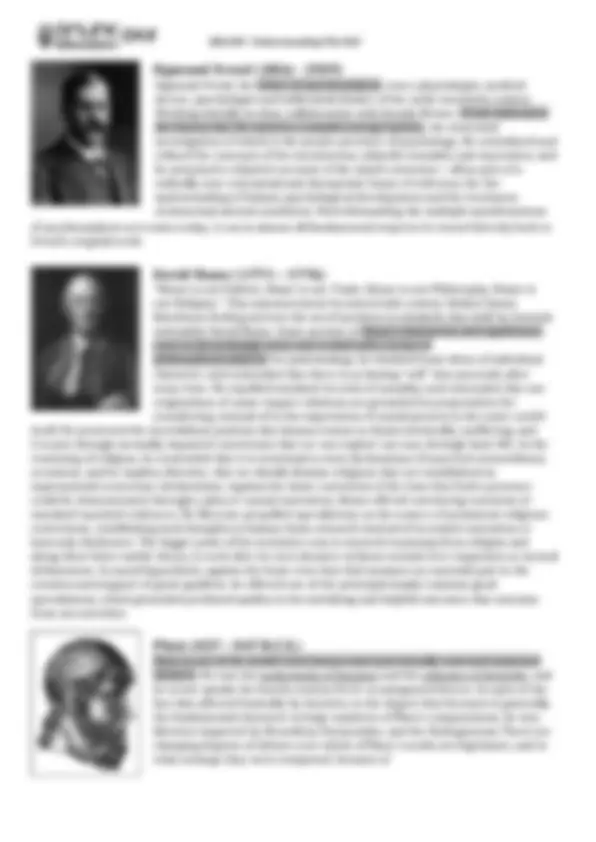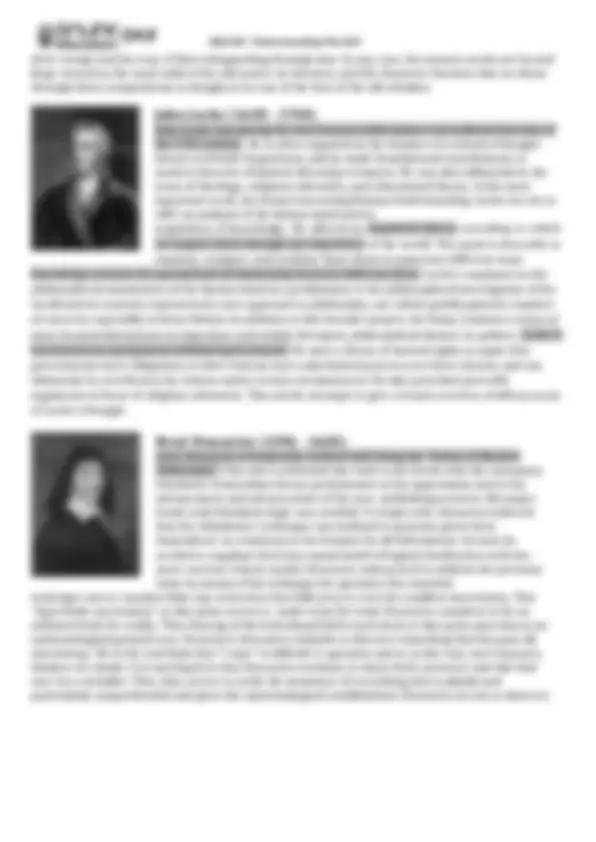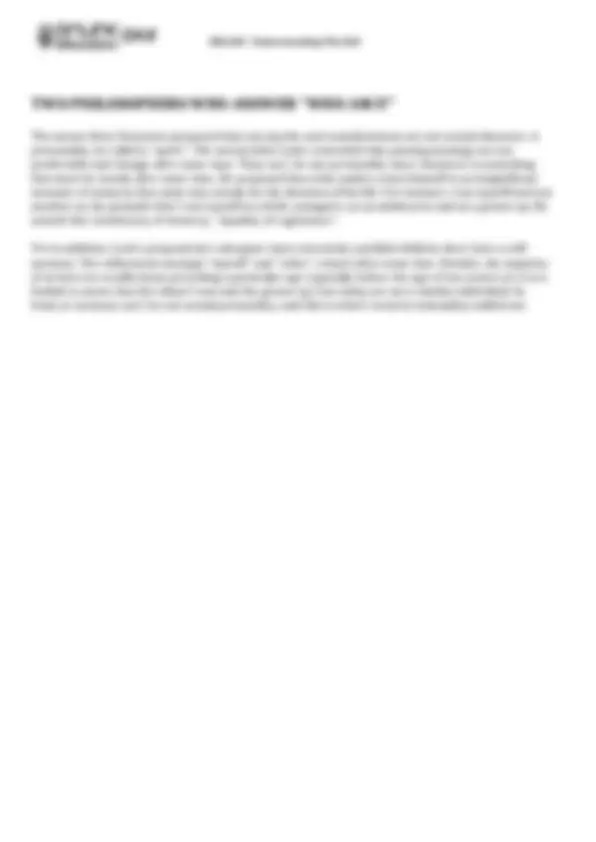





Study with the several resources on Docsity

Earn points by helping other students or get them with a premium plan


Prepare for your exams
Study with the several resources on Docsity

Earn points to download
Earn points by helping other students or get them with a premium plan
Community
Ask the community for help and clear up your study doubts
Discover the best universities in your country according to Docsity users
Free resources
Download our free guides on studying techniques, anxiety management strategies, and thesis advice from Docsity tutors
"Understanding the Self" is a fundamental and intricate topic within the field of psychology that focuses on exploring and comprehending the nature of one's identity, thoughts, feelings, behaviors, and overall sense of being. This subject delves into the complex interplay of psychological, cognitive, emotional, and social factors that contribute to shaping an individual's self-concept and self-awareness.
Typology: Lecture notes
1 / 7

This page cannot be seen from the preview
Don't miss anything!




Comes from two Greek words philos which means “love” and sophia which means “wisdom” In essence it can be translated to love of knowledge of passion for learning. It is the investigation of normal and fundamental issues. Concerning matters, for example, presence, information, values, reason, psyche, and dialect. The term was likely instituted by Pythagoras (c. 570 – 495 BCE). Philosophical strategies incorporate addressing, basic dialog, judicious contention, and deliberate introduction. Exemplary philosophical inquiries include: Is it conceivable to know anything and to demonstrate it? What is generally genuine? Scholars likewise posture a more handy and solid inquiries, for example, Is there a most ideal approach to live? Is it better to be simply or shameful (in the event that one can escape with it)? Do people have through and through freedom? Generally, philosophy deals with the rationality employed by individuals in learning. Starting from the Ancient Greek savant Aristotle to the nineteenth century philosophers, who tried to explore and understand the rationality employed in understanding and learning things. Aristotle looked into regular reasoning in discovering and learning. Aristotle employed stargazing, pharmaceutical, and material science. Another is, Newton's 1687 Mathematical Principles of Natural Philosophy later ended up named a book of material science. In the nineteenth century, the development of current research, methods of inquiry has evolved. Different approaches to inquiry by different colleges drove scholarly rationality and different orders to professionalize and practice the continuous search for learning. In the cutting edge period, a few examinations that were customarily part of logic wound up particular scholarly approaches including brain science, humanism, phonetics, and financial matters.
St. Augustine is a fourth century scholar whose notable theory implanted Christian teaching with Neoplatonism. He is well known for being a matchless Catholic scholar and for his freethinker commitments to Western logic. He contends that doubters have no reason for asserting to realize that there is no learning. In a proof for presence like one later made acclaimed by René Descartes, Augustine says, "[Even] If I am mixed up, I am." He is the primary Western savant to elevate what has come to be called "the contention by relationship" against solipsism: there are bodies outside to mine that carry on as I act and that seem, by all accounts, to be supported as mine is sustained; along these lines, by similarity, I am defended in trusting that these bodies have a comparable mental life to mine. Augustine trusts motivation to be an extraordinarily human psychological limit that appreciates deductive facts and sensible need. Furthermore, Augustine receives a subjective perspective of time and says that time is nothing in all actuality except for exists just in the human
personality's worry of the real world. He trusts that time isn't vast in light of the fact that God "made" it.
their vestige and the way of their safeguarding through time. In any case, his soonest works are by and large viewed as the most solid of the old source on Socrates, and the character Socrates that we know through these compositions is thought to be one of the best of the old scholars.
John Locke was among the most famous philosophers and political theorists of the 17th century. He is often regarded as the founder of a school of thought known as British Empiricism, and he made foundational contributions to modern theories of limited, liberal government. He was also influential in the areas of theology, religious toleration, and educational theory. In his most important work, the Essay Concerning Human Understanding, Locke set out to offer an analysis of the human mind and its acquisition of knowledge. He offered an empiricist theory according to which we acquire ideas through our experience of the world. The mind is then able to examine, compare, and combine these ideas in numerous different ways. Knowledge consists of a special kind of relationship between different ideas. Locke’s emphasis on the philosophical examination of the human mind as a preliminary to the philosophical investigation of the world and its contents represented a new approach to philosophy, one which quickly gained a number of converts, especially in Great Britain. In addition to this broader project, the Essay contains a series of more focused discussions on important, and widely divergent, philosophical themes. In politics, Locke is best known as a proponent of limited government. He uses a theory of natural rights to argue that governments have obligations to their citizens, have only limited powers over their citizens, and can ultimately be overthrown by citizens under certain circumstances. He also provided powerful arguments in favor of religious toleration. This article attempts to give a broad overview of all key areas of Locke’s thought.
René Descartes is frequently credited with being the "Father of Modern Philosophy." This title is defended due both to his break with the customary Scholastic-Aristotelian theory predominant at his opportunity and to his advancement and advancement of the new, unthinking sciences. His major break with Scholastic logic was twofold. To begin with, Descartes believed that the Scholastics' technique was inclined to question given their dependence on sensation as the hotspot for all information. Second, he needed to supplant their last causal model of logical clarification with the more current, robotic model. Descartes endeavored to address the previous issue by means of his technique for question. His essential technique was to consider false any conviction that falls prey to even the smallest uncertainty. This "hyperbolic uncertainty" at that point serves to make room for what Descartes considers to be an unbiased look for reality. This clearing of his beforehand held convictions at that point puts him at an epistemological ground-zero. From here Descartes embarks to discover something that lies past all uncertainty. He in the end finds that "I exist" is difficult to question and is, in this way, sure beyond a shadow of a doubt. It is starting here that Descartes continues to show God's presence and that God can't be a swindler. This, thus, serves to settle the assurance of everything that is plainly and particularly comprehended and gives the epistemological establishment Descartes set out to discover
TWO PHILOSOPHERS WHO ANSWER "WHO AM I?" The savant Rene Descartes proposed that our psyche and considerations are our actual character. A personality, he called a "spirit". The savant John Locke contended that passing musings are not predictable and change after some time. They can't be our personality since character is something that must be steady after some time. He proposed that what makes a man himself is an insignificant measure of memory that must stay steady for the duration of his life. For instance, I am myself and not another on the grounds that I was myself as a little youngster, as an adolescent and as a grown-up. He named this consistency of memory, "equality of cognizance". Yet in addition, Lock's proposal isn't adequate since extremely youthful children don't have a self- memory. The refinement amongst "myself" and "other" creates after some time. Besides, the majority of us have no recollections preceding a particular age (typically before the age of two years) yet it is a foolish to assert that the infant I was and the grown-up I am today are not a similar individual. So brain or memory can't be our actual personality, and this is where western rationality stalled out.